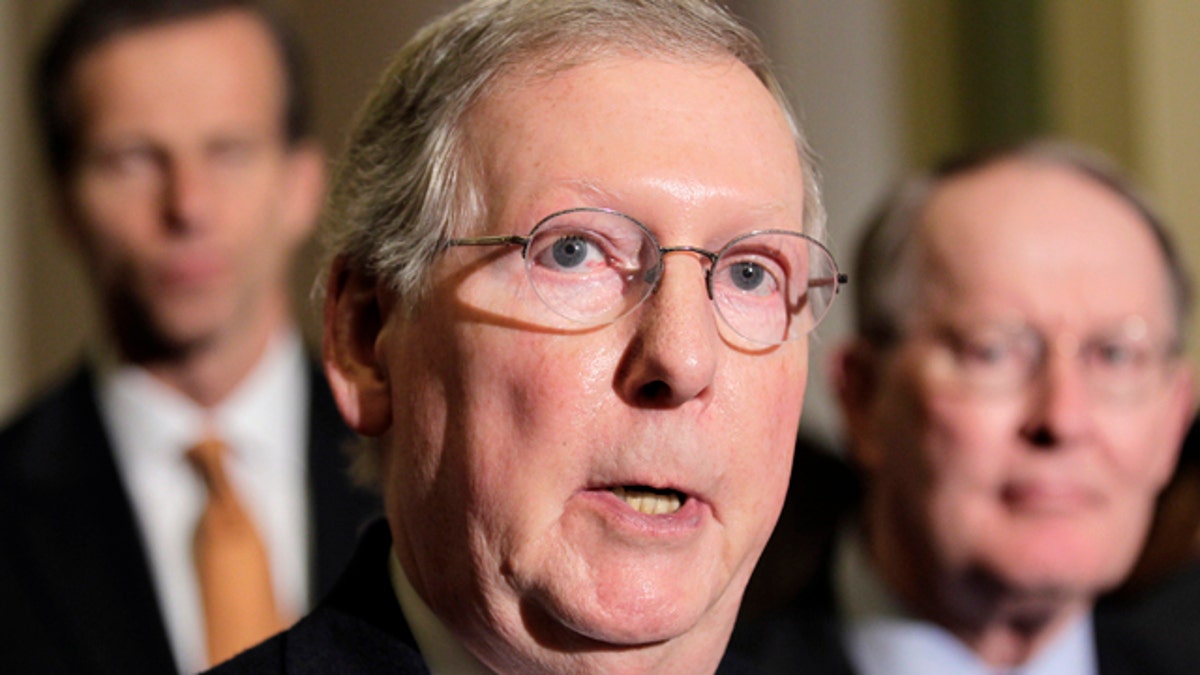
March 8, 2011: Senate Republican leader, Mitch McConnell of Kentucky, speaks with reporters following a weekly Republican policy luncheon, on Capitol Hill in Washington (AP)
WASHINGTON -- All 47 Senate Republicans will vote against raising the debt ceiling unless "something important" is done to prevent the ever-increasing U.S. national debt, Senate Minority Leader Mitch McConnell said Sunday.
McConnell, R-Ky., said he would negotiate the deal on "Fox News Sunday" but the administration and Congress all know what that means.
"We're just not going to bring up the debt ceiling and everybody say all right. It's going to have to carry something with it that the markets, foreign countries, the American people believe is a credible effort to begin to get a handle on spending and debt," he said.
The Senate minority leader would not predict what House Republicans will do in a vote coming in the next month or two on raising the $14.3 trillion debt ceiling -- despite House Speaker John Boehner saying last week that failing to raise the debt limit "would send our economy into a tailspin."
But McConnell said he has a pretty good idea how Senate Republicans will react.
"My prediction is not a single one of the 47 Republicans will vote to raise the debt ceiling unless it includes with it some credible effort to do something about our debt. ... I don't believe Senate Republicans are going to vote to raise the debt ceiling. The Democrats can raise it themselves if they choose to and try to do nothing whatsoever about the problem," he said.
Democrats are looking for an opportunity to cast Republicans as irresponsible when it comes to the U.S. economy and failure to raise the debt ceiling is a surefire way to damage U.S. interests. But Democrats have also been insistent they oppose massive spending proposals offered by House Republicans for the rest of the fiscal year ending Sept. 30.
Senate Majority Whip Dick Durbin, D-Ill., told CNN that lawmakers will agree this week to another three-week continuing resolution, but that doesn't mean Republicans and Democrats have come any closer to agreement on a budget for fiscal year 2011.
"We should be taking care that we don't do things that damage our economy and really slow down our recovery. ... (The GOP plan) goes way too far. And it goes in a direction not good for this country," Durbin said.
Durbin also disregarded complaints by members of his own party that Democratic-recommended spending cuts for the year are too small or change is taking too long.
"We have a serious deficit problem, borrowing 40 cents for every dollar we spend," Durbin said. "We cannot solve this problem in six months. We have to look at it in the medium and long-term for the good of this nation and for our financial reputation in the world."
Sen. Mark Warner, D-Va., agreed with Durbin -- as well as McConnell -- saying he and Sen. Saxby Chambliss, R-Ga., are looking at a plan to reduce government spending by $4 trillion -- over 10 years. It includes putting everything on the table, including entitlement reform, changes to the tax code and reduced spending to prevent hitting another debt ceiling.
"If we focus the discussion as we have so far on the back and forth in Congress, all you're cutting is 12 percent of the federal budget, the domestic discretionary spending. And you are seeing actually good programs perhaps being eliminated because you focus the discussion only in that area," Warner told "Fox News Sunday."
"We're not going to dig out in a single year. But if we put a plan in place, I think the markets will respond and I actually think the economy will be better. But that's going to require a little give from both sides. ... Every day that we punt, every day that we don't act, we add $4 billion to our national debt. At some point, we're going to have to pay that back," Warner said.
Chambliss added that the debt is so "massive" -- $14 trillion -- that "if we don't get our arms around it now, and then we're going to become a second-tier nation."
He proposed taking some ideas from President Obama's unsuccessful deficit reduction commission, which recommended not just using future revenues for tax rate reductions but taking somewhere between 10 and 20 percent of them and applying it to the $14 trillion debt.
"Otherwise, if we don't commit some of it to that, we're going to be stuck with this $14 trillion debt and it's only going to increase. And that's not right," Chambliss said.
Indiana Gov. Mitch Daniels, a prospective 2012 Republican presidential candidate, doesn't have a say in the budget negotiations on Capitol Hill but noted that the debt is "a heck of a lot more serious" now -- nearly triple what it was when he was former President George W. Bush's budget director.
Daniels called the debt ceilings "rear-view mirror exercises in paying for" excesses in recent years.
"At some stage, you have to do it in honor of the country's obligations. But I definitely think in the really critical fiscal corner we've painted ourselves into, it's entirely appropriate to use that moment, to surface these issues and I hope for some leverage to get some real change. Not just cosmetic," he told NBC's "Meet the Press."




